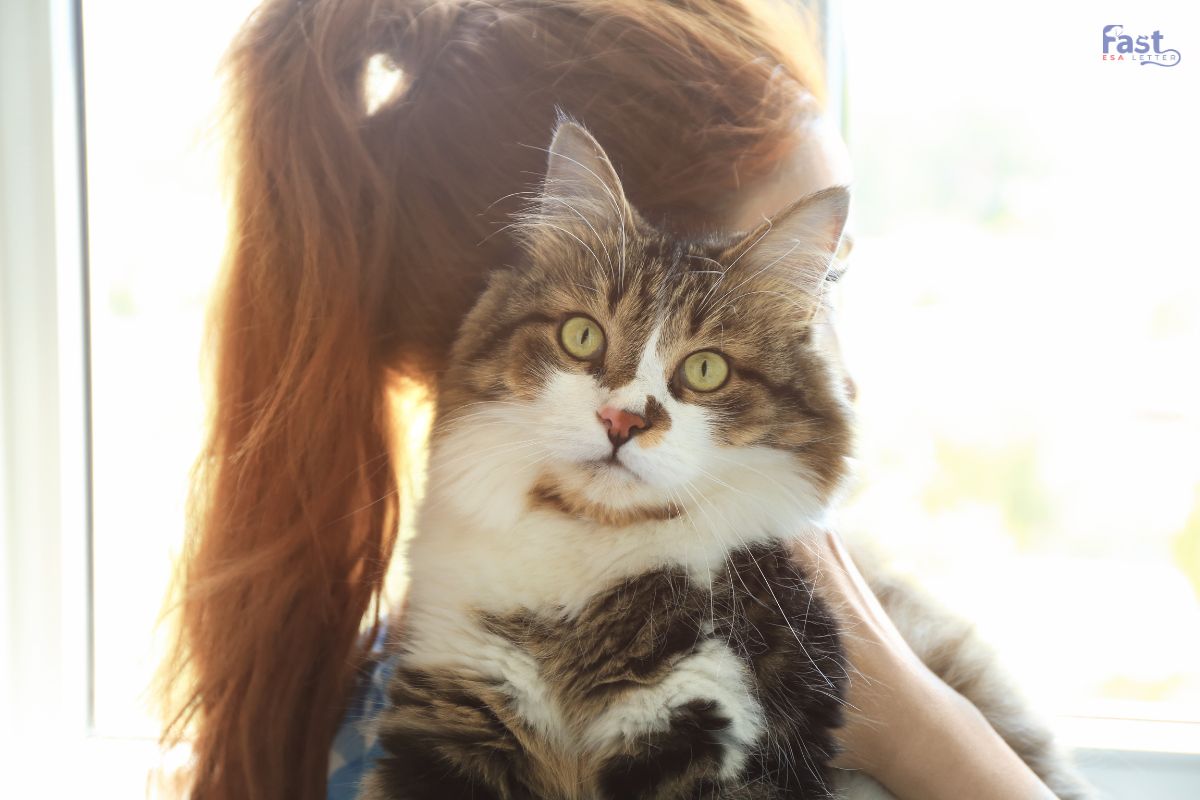Do Cats Help with Anxiety?

Robert Clendenin, MD
Whether you’re someone with generalized anxiety disorder (GAD), social anxiety, or just occasional bouts of stress, this article will cover everything you need to know about the benefits of having a cat for anxiety relief.

How Do Cats Help with Anxiety?
1. Physical Touch and Petting
2. The Power of Purring
3. Unconditional Companionship
4. Routine Formation
5. Calming Presence
What Are The Best Cat Breeds for Anxiety Relief?
While almost any cat can provide emotional support, some breeds are especially known for their calming and affectionate nature. These breeds tend to bond closely with their owners and are often recommended for those seeking emotional support animals (ESAs) to cope with anxiety or depression.
1. Ragdoll – Best Cat Breed for Anxiety
2. Sphynx Cats
3. Scottish Fold Cats
4. Maine Coon Cats
5. Birman Cats
Is There Any Scientific Evidence That Proves Cats Can Reduce Anxiety and Stress?
Do Cats Sense Anxiety?
When you’re feeling anxious or upset, your cat might come closer to you or sit on your lap. This intuitive behavior helps many cat owners feel supported during times of stress. Cats also use body language, like rubbing against you or purring, to signal that they are offering comfort.
How Can I Strengthen My Bond with My Cat for Anxiety Relief?
To maximize the anxiety-reducing benefits of owning a cat, it’s important to nurture a strong bond with your feline friend. Here are some tips on how to strengthen that connection:
- Daily Playtime: Engaging your cat with toys like laser pointers or feather wands not only reduces their boredom but also relieves your stress. It creates a sense of routine and enhances your bond with your pet.
- Gentle Petting and Grooming: Take time to pet your cat slowly and gently. This not only calms you but also promotes trust between you and your pet, which is important for emotional support animals.
- Cozy Spaces: Create a safe and cozy area in your home where your cat can relax. Cats love having their own “hideout,” and knowing they are comfortable can also provide you with a sense of peace.
- Quiet Moments Together: Sometimes, just sitting quietly with your cat while reading, watching TV, or meditating can provide a calm environment that helps both of you relax.
Are Cats a Good Fit for Everyone with Anxiety?
While cats help with anxiety for many people, they are not always the right fit for everyone. Here are a few considerations:
- Allergies: If you have pet allergies, owning a cat could worsen your symptoms. It’s important to consider this before adopting.
- Independent Nature: Cats are more independent than dogs, which can be a good thing for some people. However, if you prefer a more interactive pet or need constant companionship, a dog might be a better fit.
- Space Considerations: If you live in a small apartment, a cat can be a perfect esa as they don’t require a lot of space. However, it’s important to ensure that your living environment is conducive to keeping a pet.
Conclusion
Are you ready to welcome a cat into your life? The rewards of building a bond with a feline friend go far beyond just anxiety relief—they bring joy, comfort, and unconditional love.
Frequently Asked Questions (FAQs)
Can a Cat Be An Emotional Support Animal (ESA)?
Are There Any Downsides To Having a Cat For Anxiety?
How Do I Know If My Cat is Helping My Anxiety?
How Often Should I Spend Tme With My Cat To Reduce Anxiety And Stress?
How Do I Know If a Cat is Right For My Anxiety?
Can All Cats Help With Anxiety, Or Do I Need a Special Breed?
Can Cats Be Trained To Help With Anxiety?
What’s The Difference Between An Emotional Support Cat And a Regular Pet Cat?
An emotional support cat (ESA) is prescribed by a mental health professional to help with anxiety or depression. ESAs offer legal protections for housing under the Fair Housing Act, while regular pets do not. However, ESAs are not trained like service animals and don’t have the same public access rights.
Can Cats Help With Other Mental Health Conditions, Like Depression?
Are Cats Better Than Dogs For Anxiety Relief?
What Are The Costs Of Owning a Cat For Anxiety Relief?
How Long Does It Take To Feel The Anxiety-Relieving Effects Of Owning a Cat?
Can Spending Too Much Time With My Cat Cause Separation Anxiety?
Do Indoor or Outdoor Cats Provide Better Emotional Support?
What Are The Legal Protections For Emotional Support Cats in Housing?
Do Cats Help Children With Anxiety?
Post Author
Prince Sharma
Related Articles
Fast ESA Letter vs. Real ESA Letter: Which ESA Service is Right for You?
Fast ESA Letter vs. Real ESA Letter: Which ESA Service is Right for You?Both Fast ESA Letter and Real ESA Letter provide ESA and PSD letters, but Fast ESA Letter truly stands out for its authenticity, trusted customer base, dedicated support, and...
Fast ESA Letter vs ESA Pet: Which Service Should You Trust?
Fast ESA Letter vs ESA Pet: Which Service Should You Trust?Both Fast ESA Letter and ESA Pet connect you with licensed professionals, but only one consistently delivers on speed, pricing, and support. If you want an ESA letter without delays, hidden...
Fast ESA Letter vs. My ESA Doctor: Which ESA Service is Right for You?
Fast ESA Letter vs. My ESA Doctor: Which ESA Service is Right for You?Fast ESA Letter and ESA Doctors both facilitate access to licensed mental health professionals for ESA letters. Each service has its own approach, and understanding the differences...
Live Free with Your ESA!
An ESA Letter Unlocks Freedom!






